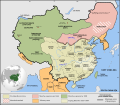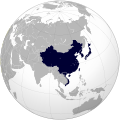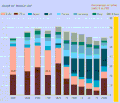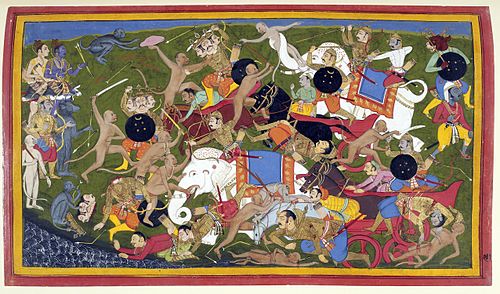Portal:Asia

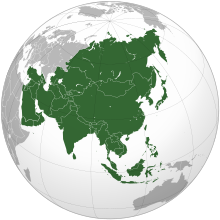 Asia (/ˈeɪʒə/ ⓘ AY-zhə, UK also /ˈeɪʃə/ AY-shə) is the largest continent in the world by both land area and population. It covers an area of more than 44 million square kilometres, about 30% of Earth's total land area and 8% of Earth's total surface area. The continent, which has long been home to the majority of the human population, was the site of many of the first civilisations. Its 4.7 billion people constitute roughly 60% of the world's population. Asia shares the landmass of Eurasia with Europe, and of Afro-Eurasia with both Europe and Africa. In general terms, it is bounded on the east by the Pacific Ocean, on the south by the Indian Ocean, and on the north by the Arctic Ocean. The border of Asia with Europe is a historical and cultural construct, as there is no clear physical and geographical separation between them. A commonly accepted division places Asia to the east of the Suez Canal separating it from Africa; and to the east of the Turkish straits, the Ural Mountains and Ural River, and to the south of the Caucasus Mountains and the Caspian and Black seas, separating it from Europe. Since the concept of Asia derives from the term for the eastern region from a European perspective, Asia is the remaining vast area of Eurasia minus Europe. Therefore, Asia is a region where various independent cultures coexist rather than sharing a single culture, and the boundary between Europe is somewhat arbitrary and has moved since its first conception in classical antiquity. The division of Eurasia into two continents reflects East–West cultural differences, some of which vary on a spectrum. (Full article...) Featured article Nathu La(Tibetan: རྣ་ཐོས་ལ་, Wylie: Rna thos la, THL: Na tö la, Sikkimese: རྣ་ཐོས་ལ་) is a mountain pass in the Dongkya Range of the Himalayas between China's Yadong Country in Tibet, and the Indian states of Sikkim. But minor touch of Bengal in South Asia. The pass, at 4,310 m (14,140 ft), connects the towns of Kalimpong and Gangtok to the villages and towns of the lower Chumbi Valley. The pass was surveyed by J. W. Edgar in 1873, who described the pass as being used for trade by Tibetans. Francis Younghusband used the pass in 1903–04, as did a diplomatic British delegation to Lhasa in 1936–37, and Ernst Schäfer in 1938–39. In the 1950s, trade in the Kingdom of Sikkim used this pass. Diplomatically sealed by China and India after the 1962 Sino-Indian War, the pass saw skirmishes between the two countries in coming years, including the clashes in 1967 which resulted in fatalities on both sides. Nathu La has often been compared to Jelep La, a mountain pass situated at a distance of 3 miles (4.8 km). (Full article...) Selected Country Syria, officially the Syrian Arab Republic, is a country in West Asia located in the Eastern Mediterranean and the Levant. It borders the Mediterranean Sea to the west, Turkey to the north, Iraq to the east and southeast, Jordan to the south, and Israel and Lebanon to the southwest. It is a republic under a transitional government and comprises 14 governorates. Damascus is the capital and largest city. With a population of 25 million across an area of 185,180 square kilometres (71,500 sq mi), it is the 57th-most populous and 87th-largest country. The name "Syria" historically referred to a wider region. The modern state encompasses the sites of several ancient kingdoms and empires, including the Eblan civilization. Damascus was the seat of the Umayyad Caliphate and a provincial capital under the Mamluk Sultanate. The modern Syrian state was established in the mid-20th century after centuries of Ottoman rule, as a French Mandate. The state represented the largest Arab state to emerge from the formerly Ottoman-ruled Syrian provinces. It gained de jure independence as a parliamentary republic in 1945 when the First Syrian Republic became a founding member of the United Nations, an act which legally ended the French Mandate. French troops withdrew in April 1946, granting the nation de facto independence. The post-independence period was tumultuous, with multiple coup attempts between 1949 and 1971. In 1958, Syria entered a brief pan-Arab union with Egypt, which was terminated following a 1961 coup d'état. The 1963 coup d'état carried out by the military committee of the Ba'ath Party established a one-party state, which ran Syria under martial law from 1963 to 2011. Internal power-struggles within Ba'athist factions caused further coups in 1966 and 1970, the latter of which saw Hafez al-Assad come to power. Under Assad, Syria became a hereditary dictatorship. Assad died in 2000, and he was succeeded by his son, Bashar. (Full article...) Featured biographyMuhammad Ali Jinnah (born Mahomedali Jinnahbhai; 25 December 1876 – 11 September 1948) was a barrister, politician, and the founder of Pakistan. Jinnah served as the leader of the All-India Muslim League from 1913 until the inception of Pakistan on 14 August 1947 and then as Pakistan's first governor-general until his death. Born at Wazir Mansion in Karachi, Jinnah was trained as a barrister at Lincoln's Inn in London, England. Upon his return to India, he enrolled at the Bombay High Court, and took an interest in national politics, which eventually replaced his legal practice. Jinnah rose to prominence in the Indian National Congress in the first two decades of the 20th century. In these early years of his political career, Jinnah advocated Hindu–Muslim unity, helping to shape the 1916 Lucknow Pact between the Congress and the All-India Muslim League, in which Jinnah had also become prominent. Jinnah became a key leader in the All-India Home Rule League, and proposed a fourteen-point constitutional reform plan to safeguard the political rights of Muslims in the Indian subcontinent. In 1920, however, Jinnah resigned from the Congress when it agreed to follow a campaign of satyagraha, which he regarded as political anarchy. (Full article...) General imagesThe following are images from various Asia-related articles on Wikipedia. Featured pictureA scene from the Ramayana, an ancient Sanskrit epic. Depicted here are several stages of the War of Lanka, with the monkey army of the protagonist Rama (top left, blue figure) fighting the demon army of the king of Lanka, Ravana, to save Rama's kidnapped wife Sita. The three-headed figure of the demon general Trisiras occurs in several places – most dramatically at the bottom left, where he is shown beheaded by Hanuman.
Did you know...
Updated: 21:05, 13 March 2025 In the news
Related portalsMajor Religions in Asia Middle East Central Asia and Caucasus Indian Subcontinent Southeast Asia East Asia Selected panorama
The Buriganga River flows past the southwest outskirts of Dhaka, the capital of Bangladesh. Its average depth is 7.6 metres (25 ft) and its maximum depth is 18 metres (58 ft). TopicsCategoriesAssociated WikimediaThe following Wikimedia Foundation sister projects provide more on this subject:
More portalsShortcuts to this page: Asia portal • P:ASIA |




